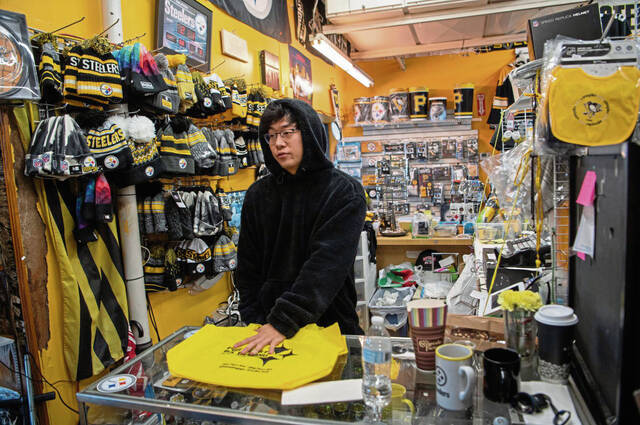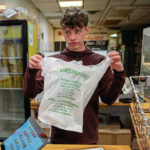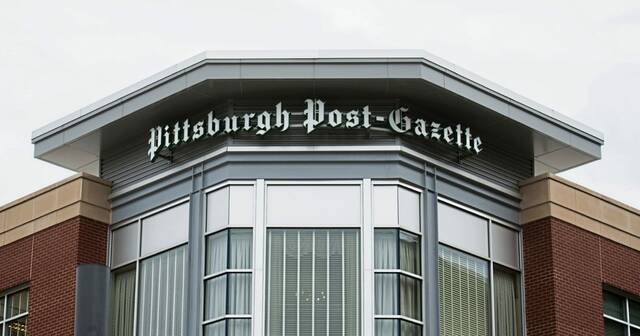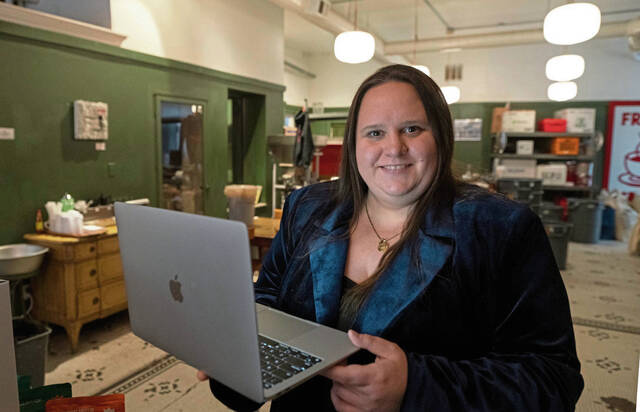Jake Diettrich, manager of Market Outlet, a Pittsburgh produce shop, has been grappling since January with the city’s plastic bag ban.
Diettrich has had to calm grumbling patrons, swap his stock of outlawed plastic bags for pricier paper ones and contend with worries that the bag ban and mandatory fees for paper bags could push frustrated customers away from Strip District businesses.
Throughout the long run-up to the ban’s enforcement, Diettrich said, he received no communication from the city.
He’s not alone. Large and small businesses throughout Pittsburgh report the same problem, according to an informal survey by TribLive.
The bag ban rollout has been hampered by misunderstandings, poor communication and an impractical enforcement strategy that leaves one person responsible for ensuring compliance at every one of the hundreds of affected businesses throughout the city.
In short, Diettrich said recently, the bag ban has been “a big fumble.”
He pointed to the fact that some stores within city limits continue to use plastic bags with no immediate repercussions.
Business owners, workers and shoppers have voiced frustration and confusion.
Many have said they agree with the ban’s underlying goals: Reduce plastic waste, cut back on litter and save the environment, one shopping bag at a time. But some don’t believe the city has done enough to explain the rules to the public or to ensure businesses will comply.
“We haven’t heard anything from the city at all,” said Maria Merante, owner of Merante’s, an Italian grocery store in Bloomfield. “Nobody came to tell us anything. What we hear, we hear from television and local (news) reports.”
Noble intentions
The legislation was supposed to be a signature environmental initiative. Pittsburgh would become the first Pennsylvania municipality outside the Philadelphia area to prohibit businesses from giving customers plastic bags, with exceptions for meat packaging, flowers, prepared foods and other specific uses.
To encourage reusable bags, stores must charge at least 10 cents for paper bags. They don’t need to provide proof to the city. But, if an inspection turns up evidence that they’re not tacking on the fee, they could be fined.
Introduced in 2021 by Councilwoman Erika Strassburger, D-Squirrel Hill, the legislation was heralded as a way to cut down on the more than 100 million plastic bags Pittsburghers use each year.
Strassburger touted the ban as making an “incredible impact for the future” and said it would align with the city’s broader climate action plan and zero-waste goals.
Groups like PennEnvironment have been enthusiastic.
“Nothing we use for a few minutes should be allowed to litter our communities and pollute our environment for centuries,” said Ashleigh Deemer, PennEnvironment’s deputy director.
Despite noble intentions, Pittsburgh’s switch to paper from plastic hasn’t been smooth, despite having nearly two years to prepare after council voted in April 2022 for the ban.
TribLive talked to more than three dozen businesses in neighborhoods including Downtown, Larimer, Brookline, Bloomfield, Lawrenceville and the Strip District.
Sixteen were not complying with the ban — though almost all of them said they believed they were — and reported no direct outreach from city officials.
Those businesses reported being unaware of the requirement to charge 10 cents for paper bags or mistakenly believed they still could use their existing inventory of plastic bags. Some thought they could opt not to charge for paper bags because they used recyclable materials. One business was wholly unaware a bag ban existed.
Another 10 that were complying said they also had heard nothing from officials and learned about the bag ban by reviewing the legislation, reading news reports or talking to other business owners.
Several business owners and managers reported getting their information about the ban only from word of mouth or the news.
Frustration abounds
Merante said she “could’ve used more clarity” as she sifted through the “mixed messages” she has heard about the bag ban. She said her shop swapped plastic for paper, but they’re not charging 10 cents for paper bags — and she’s confused about whether the law says she must.
Voodoo Brewing on the city’s North Shore said the same.
Kyle Lucas, the general manager, said he’s in favor of banning plastic bags but was unaware of the mandated 10-cent fee and frustrated he hadn’t received guidance from the city.
He said he has talked with other business managers who have come together to try to figure out what the ban was and when it went into effect.
“I definitely wish someone would’ve called or there could’ve been a leaflet or something just so everyone was on the same page,” he said.
Rich Cupka, who owns two South Side bars, said he was flouting the new rules. He said he thought the city should be prioritizing bigger problems — like crime and infrastructure — rather than punishing businesses for handing out plastic bags.
Like many other business owners, he said he heard nothing from the city.
“It’s normal procedure for the city to be vague and nonproductive,” he said. “Everything they do is ineffective.”
Several business managers and owners told TribLive they were afraid the city would fine them for violating the rule even though they were trying to comply. Business owners said it was difficult to understand the jargon-heavy legislation, find accurate information and implement an ordinance they didn’t fully understand.
People said the way the city handled the ban was frustrating, and they wished officials would have communicated with businesses before enforcing it. Some business owners said they would be upset if they were fined after thinking they were in compliance because no one had told them otherwise.
Strassburger countered that such “hiccups” are to be expected.
“It’s a process,” she said. “After a couple years, it’ll become more commonplace.”
Bag czar
Although the ordinance took effect in October, enforcement did not start until Jan. 1.
Pittsburgh officials have been secretive about compliance efforts.
Neither the city’s lone bag-ban enforcement officer nor Mayor Ed Gainey’s office would disclose which stores have been the subject of complaints.
Officials would not publicly estimate how long it might take for the bag czar to inspect every business that’s expected to comply.
Olga George, a spokeswoman for Gainey, said the city reached out to about 1,000 businesses through newsletters, webinars, emails, phone calls and in-person visits to make them aware of the bag ban. There are about 3,000 businesses citywide, she said, though the ordinance impacts only those that sell goods.
“While we hoped to reach more businesses in advance of the ordinance going into effect, some have not received the information,” George acknowledged.
The rollout is a “work in progress,” she said, but businesses are responsible for coming into compliance.
That, George said, takes time. Businesses must change their policies, she noted, and shoppers have to modify their behavior.
Tobias Raether — the one-man team responsible for enforcing the ban — said he has met with businesses that have expressed confusion. He said the number of calls from businesses and residents who are perplexed “definitely seems to have gone down.”
But without details from the city, Raether’s claims could not be independently verified.
Raether will make just over $69,000 this year as Pittsburgh’s environmental enforcement manager. He previously worked as an equitable mobility policy analyst for the city.
At Mancini’s bakery in the Strip District, Jason Didawick one day last month handed a couple their order in a plastic bag.
“Our policy is that we charge 25 cents for a bag,” he said, gesturing to the plastic bags behind the counter. “It’s the Pittsburgh law to charge.”
Sort of.
The ordinance requires that retailers charge at least 10 cents per paper bag.
In Philadelphia, an analysis of its bag ban found the city eliminated more than 100 million plastic bags in the city — roughly enough to fill City Hall with plastic bags every eight months.
Daniel Banko-Ferran, a University of Pittsburgh graduate student whom Philadelphia hired to lead the analysis of its ban, said in Pittsburgh and Philadelphia, he has noticed the change from plastic to paper seems to be easier for bigger stores and chains.
The ban, he said, has potential to harm small businesses during their transition from plastic to paper if they’re saddled with a stockpile of plastic bags they paid for but can’t legally use.
Several small business owners told TribLive that paper bags are pricier than their plastic counterparts.
Joe Chahine has a year’s supply of plastic bags in the basement of the Pitaland shop and restaurant in the city’s Brookline neighborhood. The Pitaland manager used to bulk order plastic bags emblazoned with the business’s logo.
He said he’s planning to use the thousands of plastic bags he still has before switching to paper.
“What we understand is we’re allowed to use our current inventory,” he said.
But that’s not correct — another example of the city’s message not getting through. As of Jan. 1, businesses were required to stop using plastic entirely, even if they had leftover inventory.
Chahine said he understands the desire to reduce plastic waste, but he voiced concerns about the cost and storage of paper bags, which take up more space than plastic.
No fines yet
Banko-Ferran said he has seen a lot of shops in Pittsburgh abiding by the plastic bag rules.
He noted that it could be hard to police the holdouts — whether they’re intentionally snubbing the law or simply unaware they’re violating it — with a one-man enforcement team.
Raether said his enforcement efforts will begin with businesses that have been flagged as noncompliant through complaints to the city’s 311 phone line. He also is prioritizing chains and bigger retailers over small businesses, even though larger chain stores like Target and Giant Eagle are already in compliance.
There have been 23 site-specific complaints through the 311 line so far, Raether said. That doesn’t count reports received via email or other means.
No one business, Raether said, has received more than two complaints.
Raether said he has been surprised that some businesses outside Pittsburgh are complying with the city’s bag ban, such as a Dollar General in Baldwin.
Common confusions come up around exceptions for the ban, such as being able to use plastic for certain prepared foods, Raether said.
There also have been reports of businesses that made the switch to paper but aren’t charging or aren’t listing the charge on receipts, which is required.
When Raether finds businesses that aren’t abiding by the ban, the first step is a written warning and an offer for more information and assistance. Businesses then have 30 days to comply. There will be a $100 fine for a second violation and a $250 fine after that. No fines have been issued yet, Raether said.
Raether couldn’t estimate how long it might take for him to inspect all of the city’s businesses and get them to abide by the rule.
For businesses still struggling, Raether said, he’s willing to help them find reputable paper bag vendors, brainstorm ways to handle the added costs and inform customers about the changes. The city recently updated its bag ban website as officials continue trying to spread the word.
Though there may be some confusion and rule-breakers, Banko-Ferran said he thinks it will just take a little time for businesses to understand and implement the requirement.
“In Philly, what we found was it took about one to three months for stores to roll out,” he said. “By the three-month period, we did see pretty good compliance at all the stores we visited.”
Confusion and pushback
Many Pittsburgh businesses have made the switch from plastic to paper.
Jaejun Lee, manager of Pittsburgh Sports in the Strip District, said he’s happy about the change.
“We support the cause,” he said, adding that people are “pretty accepting” so far.
The shop considered eliminating plastic bags even before the ban, Lee said. It now sells reusable bags for $2, though many shoppers bring their own.
City Kitchen in the East End Bakery Square development has seen “mixed reactions” from customers, said Summer Le, co-founder of Shaka Restaurant Group, which runs City Kitchen.
The business has had to juggle absorbing the added cost of paper bags — about 10 times the cost of plastic — while educating customers who are unaware of the rule, Le said.
“There’s been some confusion and occasional pushback from customers who weren’t aware of the ban or hadn’t prepared for it,” she said.
DeLuca’s Bakery in Brookline transitioned from plastic to paper in April, when the bag ban was initially meant to go into effect.
“It’s going well,” owner Bart DeLuca said.
He did, however, voice concerns about the city mandating a charge for paper bags. He said he felt it should be up to individual businesses.
“People see that as an added fee,” he said. “They don’t want to pay it.”
Banko-Ferran points to fees as a disincentive for people to use paper, which requires more emissions to produce than a plastic bag, despite the environmental damage that plastic causes.
The most environmentally friendly option, he said: a reusable bag.
Related:
• Pittsburgh businesses, shoppers prepare for plastic bag ban• Rollout of Pittsburgh's plastic bag ban leaves some customers, businesses confused
• Experts join discussion about potential plastic bag ban in Pittsburgh
What is Pittsburgh’s plastic bag ban?
The ban requires businesses to get rid of plastic bags in most circumstances. It also requires that businesses charge at least 10 cents for paper bags and list that charge on customers’ receipts. Paper bags must contain at least 40% post-consumer recycled content.
Exceptions to the ban include plastic bags used for:
- Bulk food items, like fruit, vegetables, nuts, grains and candy
- Unwrapped prepared foods or bakery items
- Flowers, potted plants and similar items
- Medications
- Garbage
- Pet waste
- Food storage













